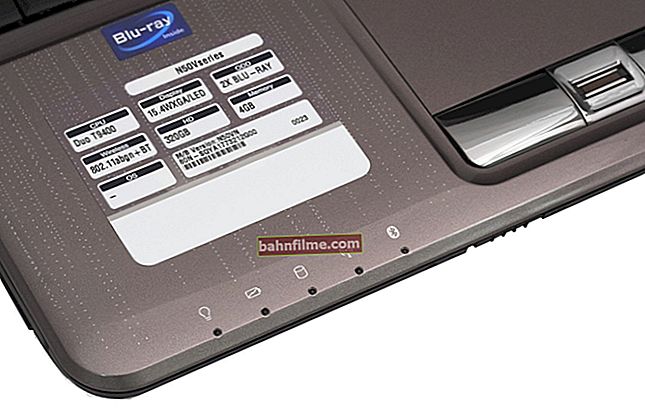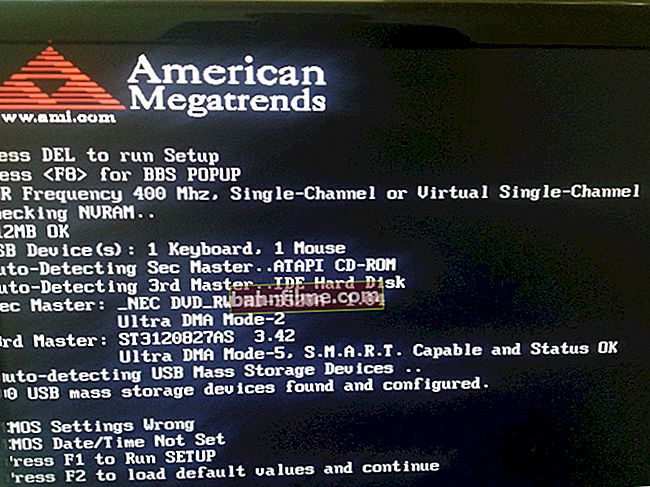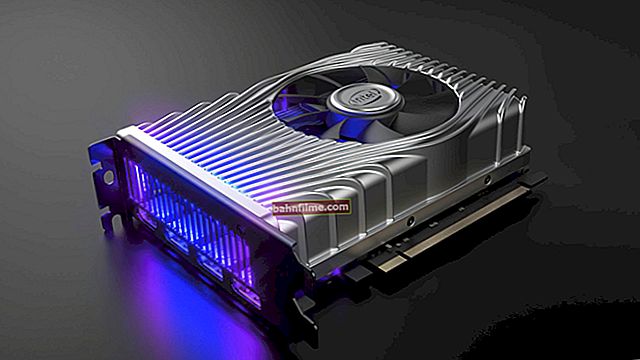 Good day!
Good day!
It's hard for me to judge others, but I remembered the breakdown of my first laptop for a long time, and the subsequent "gimp" with repair (eh, and this was more than 15 years ago, then laptops were not in such demand, and the certified repair service was 1 the whole city ...).
Since then, there have been a lot of things, but now, subconsciously, when buying a laptop (and any other equipment), you are looking for and want to pick up something more reliable (fortunately, there is a large selection on the market 👌), so that afterwards you do not waste time and money in case of possible problems repair ...
In this article I will try to point out what you need to pay attention to in order to choose a laptop that should not cause many problems with subsequent use. Hopefully the information will be useful to most users when buying a new device ...
*
Laptop reliability criteria
Manufacturer, reliability rating
I think this question is one of the most anxious. Now there are dozens of manufacturers, all of them have their own pros / cons, different lines of device models, different price categories. I would like to point out right away that something that does not break is, in principle, not! A laptop of any brand and model range can break down. However, there are statistics!
For example, a company SquareTrade conducted a statistical study on the example of 30,000 laptops of different brands (it is worth noting that the service life was limited to 3 years).
So, the statistics results are as follows (see the screen with the rating below):
- the most reliable manufacturers: Asus, Sony, Toshiba;
- the most unreliable: HP, Acer.

Laptop reliability rating compiled by SquareTrade
In principle, I do not always trust various foreign statistics, but oddly enough, it coincides with my personal opinion, as well as the opinion of my friends and colleagues who are repairing such equipment (and I think that in general it is objective!).
By the way, I spoke about this in this article: //ocomp.info/kak-vyibrat-noutbuk.html
Quoting from the article:
- HP - there are so many tempting models out there. As a rule, they are among the first to have laptops with a new generation of processors at affordable prices. Large selection of different layout options. But! I don't know why, but 4-5 out of 10 laptops that are being repaired are devices from this manufacturer (the Pavilion and Envy series stand out especially). Very unreliable, and I would recommend simply avoiding this manufacturer's laptops (at least for the time being☝);
- Acer - this manufacturer also has a very wide selection of inexpensive and mid-priced devices. However, I'd like to point out right away that Acer often has problems with cooling (especially on laptops with AMD processors). As a result, because of this, overheating is often observed, bridges "burn out", capacitors swell, and the Acer Packard Bell line does not get out of the rem. workshop (Aspire is better, but not by much. Plus, they are not easy to maintain).
However, I would like to add in HP's defense. That recently they have had a couple of lines that make them draw attention to themselves. We are talking about the Specter and ProBook (starting from the 5th series). Laptops, although not without flaws, but their reliability is much higher than that of the Pavilion or Envy series.
By the way, the ProBook has very convenient covers for quick installation of RAM, hard drive, SSD M.2 (coupled with high performance).
👉 Update from 2019
"Rossiyskaya Gazeta" in 2019 conducted research on the laptop repair market (link). They found that the following components break down most often in laptops:
- hard drives (21% of cases);
- motherboards (17% of cases);
- screen (16% of cases);
- keyboard problems (12% of cases).
In my opinion, the most sad statistics are on HDD (disks). Still, a drive failure often leads to the loss of many documents, files, etc.I recommend that everyone in advance sometimes check and evaluate the condition of the disk using this note ->
*
Processor (AMD or Intel)
I would not like to touch this eternal dispute, but I have to 👀. Now I do not take into account performance, price and other characteristics - I compare only reliability.
In my opinion, it is best to choose something from the lineup of Intel Core i3, i5, i7 processors (starting from the 7th generation (for example, the i5-7200U is the 7th generation)).
Update from 2019. Today, laptops with AMD Ryzen 5 2500U, AMD Ryzen 7 2700U processors began to appear on the market. Judging by the tests, they show quite good performance. However, it is too early to sing "praises" (there are the same problems with temperature and noise) ...
Why exactly them:
- firstly, Intel processors do not heat up as much as AMD (after all, every third laptop breakdown is associated with overheating. In a compact case, even an extra 5-10 degrees is essential!);
- secondly, because the AMD temperature is higher on average - then a more powerful cooler is needed to cool them (which means your laptop will be more noisy). In addition, in hot summer weather, the built-in cooler is often not enough and the device overheats;
- thirdly, according to statistics, laptops with Intel processors are more reliable and last longer;
- fourth, Intel processors are more energy efficient * (I'm not taking AMD Ryzen 7 2700U into account for AMD Ryzen 5 2500U yet) , which means your laptop will work more time from the battery (including less heat generated);
- Fifth, most laptops on sale now come with an Intel processor (i.e. there are plenty to choose from).
*
No discrete graphics card
On the one hand, it is good when a laptop has a discrete video card - you can play various games, it is more productive. But on the other hand, its presence reduces reliability.
The fact is that every third laptop overheating is associated with a video chip. Often, when commonplace dust that has settled on the radiator and ventilation openings for half a year is the reason that the temperature jumps by a dozen degrees and the video card becomes unusable (most often it happens in hot summer weather).
Therefore, if you look at the criterion of reliability, then choose a laptop with an integrated (built-in) video card (without a discrete video adapter).
For example, now almost every third laptop comes with an integrated Intel HD graphics card. Many people think that it is not suitable for games at all, but it is not. Its capabilities will be enough for many even modern games, if, of course, you are ready to play at low settings (see my review below 👇).
👉 To this topic!
Overview of the capabilities of the integrated Intel HD video card - //ocomp.info/intelhd-videokarta-potyanet-li.html
*
Housing
The most popular materials for a laptop case are plastic and metal (most often an aluminum alloy). In terms of reliability, of course, I would recommend choosing aluminum. Why?
- firstly, it is more durable: it does not crunch, does not bend, it is more difficult to scratch it, it does not crack, it cannot be pierced, etc .;
- secondly, it promotes better heat transfer (i.e. the likelihood of overheating is lower);
- thirdly, with strong heating, there is no smell from it, which is often from plastic (for example, in hot summer weather).
I note right away that a laptop with an aluminum case is more expensive than a plastic one (sometimes by an order of magnitude).
*
Guarantee period
Few laptop buyers pay attention to the warranty period. Most often, it is equal to 1 year.
However, approximately 10-15% of laptops on the market are sold with a 2-year warranty, and 2-3% with a 3-year warranty! Moreover, this is not some kind of extended store warranty bought for a fee.
Here I will say this: as a rule, a longer warranty period is given for higher-quality equipment. And if the manufacturer gives a 2-year warranty for some of its line of laptops - most likely, it will work out this period without problems (otherwise, it is simply not profitable)!
The warranty period helps to indirectly determine a better product, and make a choice even for those users who are poorly versed in all these pieces of iron. If something happens to a laptop after purchase, then you will be provided with free repair for 2-3 years.
*
Results. What models to look for in 2020
- From budget and inexpensive laptops - I would recommend ASUS X55A, Lenovo B50 70;
- More expensive, mid-range: ASUS ZenBook UX310, ASUS ZenBook UX410, HP ProBook (starting from the 5th series!);
- I would also pay attention to the series: Dell Latitude (5470 series), HP Specter (x360), Lenova Yoga and Lenovo ThinkPad (not to be confused with the IdeaPad line, where even adding RAM is a problem, since there are often no slots!).
- Interesting lineup from Acer - Swift 3 , but in my humble opinion, this brand still has a problem with cooling, and quite often the CPU simply drops the frequencies (due to overheating), not providing the values declared by the manufacturer.
In general, in general, summing up, I would recommend adhering to the following criteria:
- laptop based on Intel i3, i5, i7 processor. Desirable at least 7th generation (for example, Intel Core i5-7200U is the seventh generation, see the first digit), but it is better to "stare" already at the 8th Whiskey Lake 😉;
- only integrated Intel HD graphics card;
- pay attention to the manufacturer and, most importantly, the model range (because there are extremely successful, and there are extremely unsuccessful laptop models, even from the same manufacturer!);
- disk: SSD M2 PCI-e is desirable (this is not only higher speed, but also greater protection against vibrations and shocks, since SSDs are more resistant to them);
- the presence of at least 8 GB of RAM.
*
That's all 👣. Additions and criticism on the topic are welcome.
Good luck!
First publication:17.02.2018
Article revised: 01/03/2020









